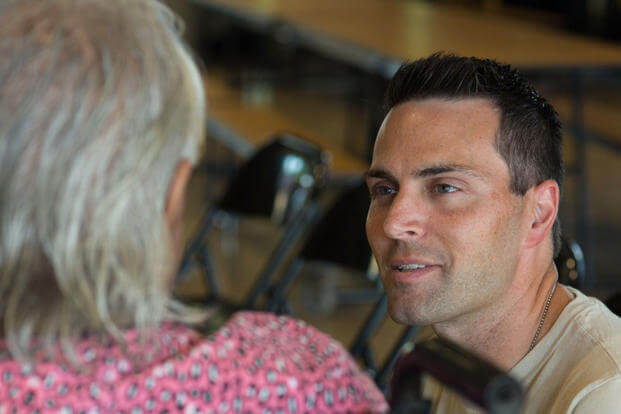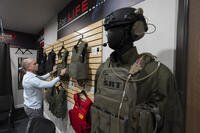MOLOKAI, Hawaii -- The first day of a no-cost health clinic provided by members of the U.S. military at the Mitchell Pauole Community Center started simply enough. The warmth of a bright sun was cooled by a warm breeze that meandered through the clinic. Community members slowly filtered in to the building to be seen by providers while others sat by waiting to be seen. All seemed like a quiet summer Sunday afternoon until a woman, who came to the clinic for a vision screening, began to say that something felt wrong. In fact, something was very wrong. The woman was having a cardiac episode, and she needed immediate medical assistance.
On August 12, service members participating in the Tropic Care Maui County 2018 Innovative Readiness Training mission reacted quickly and saved the woman's life.
"This elderly lady came in for a vision screening," said U.S. Air Force Lt. Col. Doug Sutton, a clinical nurse assigned to the 158th Fighter Wing. "Her past medical history was conducive with cardiovascular disease. As she was sitting there, she started clutching her chest. We ask her what's wrong, and she says, 'it feels like someone is stepping on my chest.' And we know that's one of the classic signs of a cardiac condition going on. We asked Col. Bray to come out, and he started assessing her."
While she was being assessed, the woman looked ashen despite her typically tanned appearance.
"She didn't look too good, to be honest," said U.S. Air Force Maj. Bryan Mathieson, a nurse practitioner assigned to the 181st Intelligence Wing. "Her face was as gray as her hair."
Suddenly, the service members assigned to the Molokai clinic for the Tropic Care mission found themselves in the midst of a real-world, medical incident.
"It was a surprise visit," said U.S. Air Force Col. William Bray, the commander of the 181st Medical Group of the 181st Intelligence Wing. "So we had to do what we could with what we had."
Bray assessed the situation and determined the woman was having a cardiac episode. Bray was able to make that determination thanks to the actions of U.S. Air Force Maj. Bryan Mathieson and 2nd Lt. Brandon Wilmer.
"They both have experience in the emergency room," said Bray. "Maj. Mathieson is the one who stepped up and gave her aspirin. His training kicked in. Both Maj. Mathieson and 2nd Lt. Wilmer were key because they are critically trained in the ER. Their natural instinct is to just roll."
Mathieson and Wilmer's actions played a critical role in helping the woman, who appeared to need immediate medical intervention.
"It happened just like that," said Sutton. "They were calm and cool, and they just reacted. Everyone's training kicked in, and they did their job perfectly. And the outcome was really good."
The service members' response to the incident did not stop at the clinic. U.S. Navy Cmdr. Jeffrey Loh, a nurse whose mother grew up on Molokai, went with the woman to the hospital.
"It just wasn't right to put them in a car and tell them to drive to the hospital," said Sutton. "So we sent Cmdr. Loh along with her in the event they needed to stop the car and administer CPR."
Loh's presence was instrumental in facilitating the woman's transfer to Molokai General Hospital.
"The woman and her daughter, who was accompanying the woman, identified with Cmdr. Loh from a cultural aspect," said Sutton. "They were very comfortable with him. It seemed natural for him to gain that trust and build the interpersonal relationship, which made them agreeable to going to the hospital for the level of care she needed after she initially refused to go."
Had the service members not reacted the way they did, the outcome could have been dire.
"She was having angina, which happens where the coronary arteries are squeezing and cause chest pain," said Sutton. "She may have dropped over had she not been taken to the hospital."
Thankfully, the woman received the care she needed.
"The daughter followed up, and the woman was released," said Bray. "She's doing well presently. We're always happy when the outcome is positive."
Despite the incident, the service members downplayed their role in taking care of the woman.
Medical professionals see people experiencing chest pain all the time in the ER, said 2nd Lt. Brandon Wilmer, a clinical nurse assigned to the 181st Intelligence Wing. It did not seem like anything out of the ordinary when it happened.
Service members were able to save a woman's life despite limited resources at the temporary medical clinic, which had only been set up the day prior.
"We definitely put the 'I' in Innovative Readiness Training," said Sutton. "We used the resources that we had quickly, efficiently, and effectively to get her to the additional level of care she needed."
The service members, by relying on their military and civilian training, worked as a team to quickly access the situation and ensure the woman received the proper level of care. What started as a normal day became urgent in a moment, and the service members did what they know best: administer medical care to save a life.














